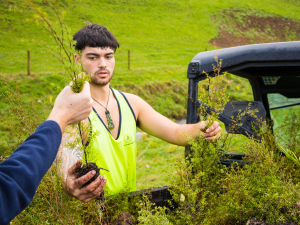Waikato dairy effluent breaches lead to $108,000 in fines
Two farmers and two farming companies were recently convicted and fined a total of $108,000 for environmental offending.
 Trey Newsome from Pūnui River Care working on the council’s two-year Clean Streams 2020 project, which was funded $1.998 million by MPI’s One Billion Trees project to enable landowners in priority catchments across the region, who permanently retire a stream, wetland or seep from grazing, have the retired area planted in native plants at no cost to them. Photo Credit: Waikato Regional Council
Trey Newsome from Pūnui River Care working on the council’s two-year Clean Streams 2020 project, which was funded $1.998 million by MPI’s One Billion Trees project to enable landowners in priority catchments across the region, who permanently retire a stream, wetland or seep from grazing, have the retired area planted in native plants at no cost to them. Photo Credit: Waikato Regional Council
Waikato landowners, supported by Waikato Regional Council, have retired the equivalent of 21 average-sized farms of unproductive land and planted over 3 million trees in the past five years.
The council’s Integrated Catchment Management directorate manages catchments in partnership with landowners to reduce soil erosion, flooding and the amount of sediment getting into waterways, and to improve water quality, river stability and river environments.
One way it does this is to help fund the costs of riparian and hill country fencing and planting.
This voluntary catchment and river restoration work is funded in different ways throughout the region, with funding coming from rates collected and/or by the council applying for funding for various work programmes from other organisations such as Waikato River Authority, the Ministry for the Environment, the Ministry for Primary Industries, the Ministry of Business, Innovation and Employment and the Waikato Catchment Enhancement Trust.
The amount of funding available to landowners depends on whether landowners live in an identified priority catchment or whether the council has secured additional funding for work programmes outside business as usual. It ranges from 35% of costs to 100%, depending on the type of work and funding available, and landowners are able to use their contribution as work in kind.
Waikato and West Coast catchments manager Grant Blackie says the council has financially assisted 1,823 landowners in the past five years, with 80% of the work funded undertaken in prioritised catchments.
“In the Waipā Zone, for example, we have catchments that are predominantly farmland and highly modified which deliver high loads of the sediment to the Waipa River, so we’ve had extra funding available for those landowners through the Waikato River Authority and MPI’s Hill Country Erosion Fund and One Billion Trees,” he says.
“Landowners are doing a phenomenal job taking care of their land and unfortunately we always have more landowners wanting to work with us than we have funding available and there are large areas of the region outside of our priority catchments where only very limited funding is available.”
Blackie says that in the past five years, landowners have retired 5,777ha of land.
“All of this work to retire unproductive land helps to contribute to cleaner water, increased biodiversity and improving the climate resilience of each farm.”
Catchment and river management work for the past five years has also included 1205 kilometres of fencing, to prevent stock access to retired land, and the planting of 3,147,324 plants, mainly native plants but also including smaller numbers of exotic afforestation species and poplar and willow poles.
“And that’s just through us. There are many landowners who fund this type of work alone or make their own applications for funding through other funding sources.”
Blackie says the value of the work completed in the region is conservatively estimated to be approximately $27 million.
The World Wide Sires National All Day Breeds Best Youth Camp Best All Rounder plaudit has become family affair, with 2026 Paramount Cup winner Holly Williams following in her sister Zara's footsteps.
DairyNZ is giving New Zealand farmers a unique opportunity to gain hands-on governance and leadership experience within the dairy sector.
Herd improvement company LIC has posted a 5.2% lift in half-year revenue, thanks to increasing demand for genetics.
According to the latest Fresh Produce Trend Report from United Fresh, 2026 will be a year where fruit and vegetables are shaped by cost pressures, rapid digital adoption, and a renewed focus on wellbeing at home.
The Roar is a highlight of the game hunting calendar in New Zealand, with thousands of hunters set to head for the hills to hunt male stags during March and April.
OPINION: The past few weeks have been tough on farms across the North Island: floods and storms have caused damage and disruption to families and businesses.

OPINION: Meanwhile, red blooded Northland politician Matua Shane Jones has provided one of the most telling quotes of the year…
OPINION: This old mutt has been around for a few years now and it seems these ‘once in 100-year’ weather…